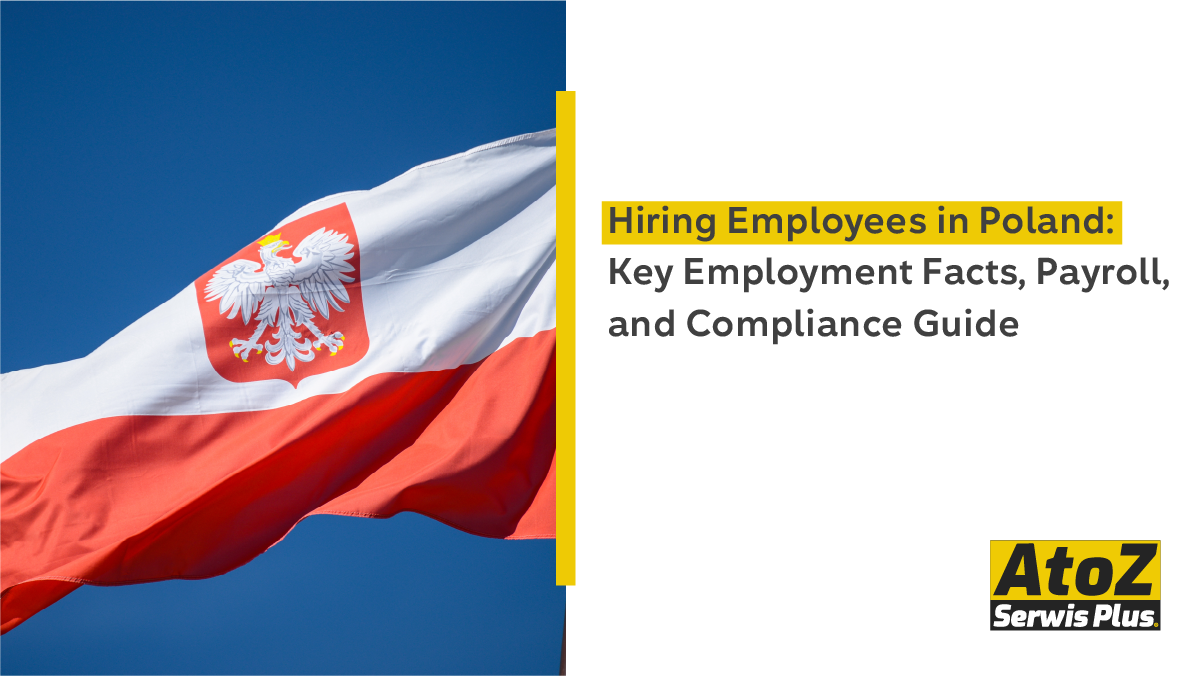

Hiring in Belgium at a Glance: Payroll & Employment Laws
Hiring Employees in Belgium at a Glance: Payroll, Employment Laws, and Employer Costs
Belgium is one of Europe’s most business-friendly destinations, known for its central location, multilingual workforce, and strong labour protections. For companies looking to expand, understanding Belgium’s employment laws, payroll taxes, benefits, and HR compliance requirements is essential. This guide provides a complete overview of what employers need to know about hiring in Belgium at a glance.
Hiring Employees in Belgium at a Glance
|
Category |
Details |
|---|---|
|
Currency |
Euro (EUR) |
|
Working Hours |
38 hours per week (sectoral agreements may slightly modify this) |
|
Public/Bank Holidays |
10 official holidays, plus sector or company-specific holidays |
|
Capital |
Brussels |
|
Language |
Dutch, French, and German (depending on the region) |
|
Remote Workers |
Allowed, but subject to tax and legal obligations depending on frequency |
|
Minimum Hourly Salary |
€12.79/hour (varies by age and sector) |
|
Tax Year |
January 1 – December 31 |
|
Date Format |
DD/MM/YYYY |
|
Misclassification Penalties |
Penalties, fines, and back payments for unpaid taxes and contributions |
|
Fun Fact |
Belgium produces over 1,500 beers; its beer culture is UNESCO-recognised |
Showcase your Employer of Record services with AtoZ Serwis Plus. Get featured in our top-ranked country guides. Register here
Taxes in Belgium
Employer Taxes (25% – 27%)
Employers in Belgium are responsible for significant contributions to the social security system.
|
Contribution Type |
Rate |
|---|---|
|
Pension |
24.92% |
|
Health and Disability |
3.80% |
|
Unemployment Insurance |
1.46% |
|
Workplace Accidents |
~0.16% (sector-specific) |
|
Family Allowances |
7.65% |
|
Occupational Diseases |
1% |
|
Holiday Pay |
10.27% (blue-collar), 1.46% (white-collar) |
|
Other Contributions |
Minor additions by sector/regional policies |
Employee Taxes (25% – 50% + 14.27% Social Security)
Belgium has a progressive income tax system combined with employee contributions.
|
Gross Income (€) |
Tax Rate |
|---|---|
|
0 – 15,200 |
25% |
|
15,201 – 26,830 |
40% |
|
26,831 – 46,440 |
45% |
|
Above 46,440 |
50% |
Employee Social Security Contributions (14.27% total):
- Pension: 7.5%
- Health and Disability: 3.55%
- Unemployment: 0.87%
- Wage Moderation: 2.35%
Employer of Record in Belgium
An Employer of Record (EOR) in Belgium is the legal employer of record for a worker. This solution allows international companies to hire employees in Belgium without setting up a local entity.
The EOR handles:
- Employment law compliance
- Payroll processing and payslips
- Filing of taxes and contributions
- Statutory benefits and HR compliance
- Salary distribution to employees
|
Party |
Role |
|---|---|
|
Company |
Manages the employee’s daily work and performance |
|
EOR Partner |
Handles payroll, compliance, and benefits under Belgian labour law |
|
Employee |
Fulfils contractual duties under the company’s direction |
Statutory Benefits in Belgium
- Health Insurance: Employers must contribute to the national health system.
- Pension Contributions: Mandatory, managed by the National Social Security Office (NSSO).
- Transportation Allowance: Employers must cover commuting costs (public transport or mileage).
Common Non-Mandatory Benefits in Belgium
- Group insurance (pension/disability)
- End-of-year bonus (13th month salary)
- Meal vouchers and eco vouchers
- Company car or mobility budget
- Flexible working hours
Employee Rights and Protections in Belgium
Employees in Belgium enjoy strong rights under labour law, including:
- Equal pay protections
- Safe and healthy workplace conditions
- Protection against unfair dismissal
- Right to pay slips and transparency in wages
- Anti-discrimination and equal treatment laws
- Protection in cases of collective dismissals
Leave in Belgium
|
Leave Type |
Entitlement |
|---|---|
|
Annual Leave |
20 days (24 for 6-day workers) + 10 public holidays |
|
Maternity Leave |
15 weeks (paid) |
|
Paternity Leave |
Up to 20 days |
|
Parental Leave |
Up to 4 months per parent, per child |
|
Sick Leave |
30 days full pay |
|
Career Break |
6–12 months (after 2 years of service) |
Employment Conditions in Belgium
Employers must provide:
- A safe workplace
- Fair wages based on collective labour agreements
- Reasonable working hours and rest breaks
- Work-life balance policies, including flexible work options
Payment Frequency in Belgium
Salaries must be paid monthly, unless otherwise agreed in a collective labour agreement.
End of Employment in Belgium
Employment contracts can end by:
- Resignation
- Mutual agreement
- Employer dismissal with valid grounds
- Expiry of a fixed-term contract
Employers must respect notice periods, severance pay requirements, and dismissal rules. Collective and unfair dismissals are strictly regulated under the Fair Work Act 2009 (Cth).
Frequently Asked Questions (FAQs) About Hiring in Belgium
What is the minimum hourly wage in Belgium?
The minimum hourly salary is €12.79, though it can vary by age, sector, and collective labour agreements.
How many hours make up the standard work week in Belgium?
The legal working week is 38 hours, but some sectoral agreements may adjust this slightly.
How many public holidays are observed in Belgium?
Employees are entitled to 10 official public holidays, plus additional company or sector-specific holidays.
Do employers need to provide written contracts in Belgium?
Yes, all employees must have a written employment contract that meets Belgian labour law requirements.
How often are salaries paid in Belgium?
Wages must be paid monthly, unless otherwise agreed in a collective labour agreement.
What taxes do employers pay in Belgium?
Employers contribute 27% to 25%–27% to social security, covering pensions, healthcare, unemployment, and other benefits.
What taxes do employees pay in Belgium?
Employees pay progressive income tax rates between 25% and 50%, plus 14.27% in social security contributions.
What benefits are mandatory in Belgium?
Employers must provide health insurance coverage, pension contributions, and transportation allowances.
What non-mandatory benefits are common in Belgium?
Many companies offer meal vouchers, eco vouchers, group insurance, flexible working hours, and end-of-year bonuses.
How many vacation days are employees entitled to in Belgium?
Employees working a five-day week receive 20 days of paid leave, plus 10 public holidays.
What is the maternity leave policy in Belgium?
Female employees are entitled to 15 weeks of maternity leave, with social security covering most of the pay.
What is the paternity leave policy in Belgium?
Fathers and co-parents are entitled to up to 20 days of paternity leave.
What protections do employees have against dismissal?
Belgian labour law requires employers to provide notice periods, severance pay, and valid reasons for dismissal.
What is the sick leave entitlement in Belgium?
Employees are entitled to 30 days of fully paid sick leave, after which Social Security provides partial benefits.
What is parental leave in Belgium?
Parents can take up to 4 months of parental leave per child, with financial support from the government.
Do employees have the right to union membership in Belgium?
Yes, employees have the right to join trade unions and benefit from collective bargaining agreements.
Can foreign companies hire employees in Belgium without a local entity?
Yes, through an Employer of Record (EOR), which allows companies to hire compliantly without establishing a subsidiary.
Who pays employee taxes and social contributions under an EOR in Belgium?
The Employer of Record files and pays all payroll taxes and social contributions on behalf of the company.
Do employees hired through an EOR receive full rights in Belgium?
Yes, employees receive all statutory benefits, including paid leave, health insurance, and pension contributions.
What are the penalties for misclassifying employees in Belgium?
Misclassification can lead to heavy fines, back payments for unpaid social contributions, and additional penalties.
Conclusion
Belgium offers a highly skilled workforce and a strong legal framework, but employers must navigate complex payroll systems, high social contributions, and strict labour protections. For international companies, partnering with an Employer of Record in Belgium ensures compliance, reduces risk, and simplifies the hiring process.
Partner with AtoZ Serwis Plus: Sponsored Articles for Employer of Record Services
Is your company providing Employer of Record (EOR) services? Join us as a Sponsored Article Partner and gain visibility across our high-ranking, country-specific employment and compliance guides.
By partnering with AtoZ Serwis Plus, your company will:
- Be featured in our country-based Employer of Record articles, reaching businesses searching for EOR solutions.
- Receive a prominent logo placement and a direct link to your website for maximum visibility.
- Enhance your SEO ranking and brand authority by partnering with reputable employment and immigration resources.
- Attract new clients looking for payroll, HR compliance, and employment outsourcing solutions worldwide.
Our platform is already indexed at the top of Google search results for EOR and employment-related queries. Becoming a Sponsored Partner ensures your business is seen by companies actively looking for Employer of Record services in Poland and other countries.
Register now and feature your company as a Sponsored Article Partner: https://www.atozserwisplus.com/sponsor/advertise.


















